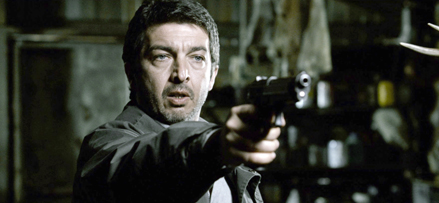|
Reviews of Recent Independent, Foreign, & Documentary Films in Theaters and DVD/Home Video
Written & Directed by: Fabián Bielinsky. Director of Photography: Checo Varese. Edited by: Alejandro Carrillo Penovi & Fernando Pardo. Produced by: Pablo Bossi, Samuel Hadida, Gerardo Herrero & Mariela Besuievsky. Released by: IFC First Take. Language: Spanish with English subtitles. Country of Origin: Argentina/Spain/France. 138 min. Not Rated. With: Ricardo Darín, Dolores Fonzi, Pablo Cedrón, Nahuel Pérez Biscayart, Jorge D’Elia, & Alejandro Awada. The late director Fabián Bielinsky, who died last July at 47 of a heart attack, hit the bull's-eye in his debut feature, Nine Queens (2000). The ultimate con in that film, thanks to Bielinsky’s crackerjack of a screenplay, is the plot itself, given that nothing is what it seems. In this follow-up, everything is clear, once the protagonist, and the audience, figure out where all the pieces go. Bielinsky has turn down the tempo a few notches, but not the tension. Instead of one elaborate confidence game, Bielinsky sticks a nameless taxidermist into the thick of things, where he tries to stay several steps ahead of an impending heist. The film’s taciturn observer, played by Ricardo Darin (the strutting con man of Nine Queens), delivers perhaps the most inward performance of the year, even rivaling Nathalie Baye in Le Petit Lieutenant. It’s the plot that does the unfolding. Taking in his surrounding while waiting in line at a bank, he matter-of-factly takes up the challenge of his fellow taxidermist, Sosa (Pablo Cedrón). Off the cuff, he comes up with a plan for a robbery, taking in a myriad of details at once, from the police response time to the numbers printed on the money bags. His mind is a steel trap; for him, the theft would be a “game.” After having declined Sosa’s invitation for a hunting weekend, a Dear Juan letter left at home changes the man’s mind. Having never hunted before, the search of an illusive deer, a shot in the thick of the Patagonian forest, and an accidental death lead to an identity switch evocative of Antonioni’s The Passenger, but Bielinsky’s protagonist is fumbling through a volatile and changing crime-in-the-planning, not an overpowering landscape, although the surrounding widescreen black-and-olive greenery almost submerges the characters. Under a new identity and a Hemingway-esque grace under pressure, the taxidermist is confronted by thugs, discovers a mysterious key, and a detailed plan for a deceptively simple casino robbery. His reactions may be inscrutable, but not his actions – he throws himself headlong, and sometimes over his head, into the underworld. Adding to the tension is not knowing when the aura will strike him – the sensation right before he passes out from an epileptic seizure.
Bielinsky stood out not only for his films’ careful and beguiling configurations, but also for creating genre films where
very little is obvious. The audience, and his characters, is kept on their toes. His work is in strong contrast to many of the
current wave of Argentinean filmmakers. Almost all are directed with minute detail and are astutely observed, but often lack
involvement, whether for the ambiguous tone toward the characters, as in Lucrecia Martel’s The Holy Girl, the over-emphasis
on atmosphere in her lethargic La Ciénaga, or the rambunctious but disappointingly open-ended slice of life in Pablo Trapero’s Rolling Family. Bielinsky’s films were also about observation, while cleverly manipulating the audience.
Kent Turner
|

